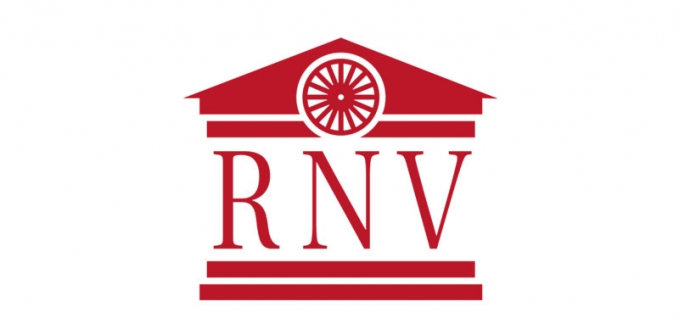Vijesti ROMI.HR
/
Prije sedamdeset godina, točnije 9. svibnja 1950. godine, francuski minister vanjskih poslova Robert Schuman, objavio je takozvanu Schumanovu deklaraciju. Na tradiciji obilježavanja ovog datuma širom Europe, nastao je Dan Europe. Cilj obilježavanja Dana Europe je promicanje europskih vrijednosti i odavanje počasti svemu što je Europska unija do sada postigla.
Prijevod: Milica Kuzmanović
Schumanova deklaracija vodila je do stvaranja Europske zajednice za ugljen i čelik koja je prethodila osnivanju EU. Cilj Zajednice bio je ujediniti se u proizvodnji ugljena i čelika šest zemalja kako bi se izbjegao rat i promicao svjetski mir. Zemlje članice Europske zajednice za ugljen i čelik bile su Francuska, Zapadna Njemačka, Italija, Nizozemska, Belgija i Luksemburg.
„Ovaj prijedlog dovešće do stvaranja prvog stvarnog temelja Europske federacije neophodne za očuvanje mira“ - Robert Schuman, 9. svibnja 1950. godine.
Danas je EU neporeciva stvarnost, prisutna u svakodnevnom životu mnogih, naročito onih koji žive u nekoj od dvadest sedam država članica Europske unije. Na primjer, zastava Europske unije, odnosno simbol sačinjen od dvanaest žutih zvjezdica na plavoj površini posloženih tako da oblikuju krug, danas je općepoznat. Ova zastava s kružno raspoređenim zvijezdama snažno simbolizira mnoge europske vrijednosti poput jedinstva, solidarnosti i sklada među ljudima.
Te vrijednosti su ono što EU proslavlja svake godine 9. svibnja kao Dan Europe. Taj datum proglašen je Danom Europe 29. lipnja 1985. godine kada je Europska zajednica, prethodnica EU-a, pokrenula projekt „mnoštvo kulturnih ikona“. Cilj je bio stvaranje europskog identiteta među državama članicama. Također, tom prilikom usvojene su zastava i himna EU ‘Oda radosti’.
Od 1985. godine, Dan Europe dobiva na značaju, a naročito nakon osnivanja EU 1993. godine. Iako je ova godina nešto drugačija, Dan Europe obilježava se u svim državama članicama, a u Luksemburgu se proslavlja kao državni praznik. Također, kako je ovaj dan vrlo važan u Njemačkoj, od 1995. godine Dan Europe obilježava se raznim događajima tokom cijelog tjedna, te je Dan Europe postao „Tjedan Europe“.
Od osnivanja Euroske zajednice za ugalj i čelik i EU značajno je promijenje život u Europi. Došlo je do zbližavanja države i ljude i usklađene borbe za ljudska prava, slobode, prava manjina i demokraciju. EU omogućila je slobode kretanja i ljudi. Iako ima još puno polja na kojima tek treba ostvariti napredak, važno je priznati sve što je EU do sada omogućila.
Međutim, EU nije jedina važna europska institucija. Iako igra važnu ulogu u europskoj politici, Vijeće Europe se često previđa. Vijeće Europe osnovano je 5. svibnja 1949. godine i ima 47 država članica, a usredotočeno je na podupiranje ljudskih prava, demokracije i vladavine zakona u Europi. Sukladno tome, Vijeće Europe proslavlja vlastiti Dan Europe četiri dana ranije, na godišnjicu osnutka. Ovaj praznika proglašen je 1964. godine.

70 years today, on the 9th May 1950, French foreign minister Robert Schuman made the so-called Schuman Declaration. This anniversary has since become a Europe-wide observance that we now know as Europe Day. The aim of this day is to celebrate the European values and to pay tribute to all that the European Union (EU) has accomplished so far.
This statement led to the creation of the European Coal and Steel Community, the predecessor of the EU. It aimed to bring together the coal and steel production of six countries (France, West Germany, Italy, the Netherlands, Belgium and Luxemburg) in order to avoid war and to promote world peace.
„ This proposal will lead to the realization of the first concrete foundation of a European federation indispensable to the preservation of peace “ – Robert Schuman, 9th May 1950
The Schuman Declaration leads to the 9th May also sometimes being referred to as “Schuman Day” and “Day of the United Europe”.
Today the EU is an undeniable part of daily life which is familiar to many, especially those living in one of the 27 member states. For example, the European flag / emblem (a circle of yellow stars on a blue background) is widespread and known by many. This flag is heavily symbolic with the stars and their circular position representing many European values such as unity, solidarity and harmony between the people of Europe.
These values are what the EU chooses to celebrate on Europe Day which takes place on the 9th May every year. This day was first introduced adopted on the 29th June 1985 when the “raft of cultural icons” project was launched by the European Communities, the predecessor of the EU. The aim of this was to create a European identity across member states. It was also on this occasion that the flag and the anthem (Ode to Joy) were adopted.
Since 1985 Europe Day has gained importance, especially after the foundation of the EU in 1993. Even if this year is slightly different, it is widely observed across the member states, even being a public holiday in Luxemburg. It is also very important in Germany, which extended the event to “Europe Week” in 1995.
Since its creation, the EU and its predecessors have revolutionised life in Europe, bringing countries and people closer together and defending rights such as freedom, human rights, minority rights and democracy. It is thanks to the EU that things such as freedom of movement and people is possible, and, even if there is a lot of progress still left to be made, it is important to recognise all that the EU has made possible.
However, the EU is not the only important European Institution. The Council of Europe (CoE) is often overlooked, even if it also plays an important role in European politics. Founded on the 5th May 1949 and with 47 member states, the CoE focuses on upholding human rights, democracy and the rule of law in Europe. Subsequently, the CoE celebrates its own Europe Day four days earlier on the anniversary of its foundation, a holiday established in 1964.













